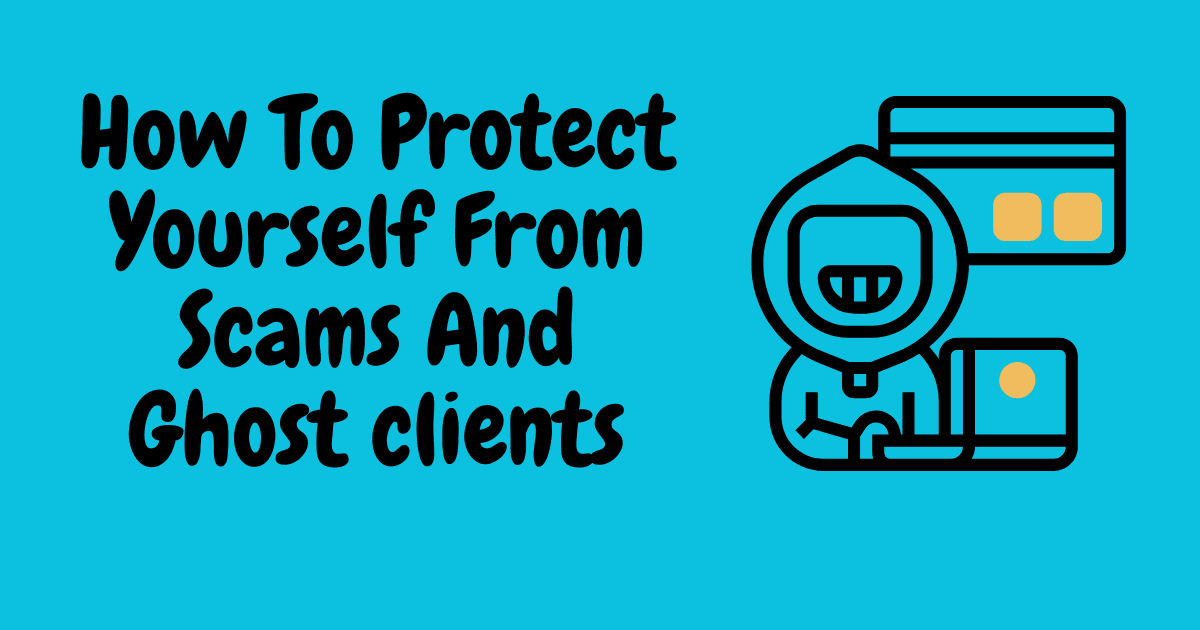The promise of online freelancing is incredibly appealing – work from the comfort of your home in Nairobi, set your own schedule, and earn in foreign currency while serving clients globally. For many Kenyan writers and creatives, freelancing represents financial freedom and professional flexibility that traditional employment often can’t match. However, beneath this exciting opportunity lies a darker reality that too many freelancers discover the hard way: scams, ghost clients, and unpaid work that can devastate both your income and confidence.
The statistics are sobering. Across Kenya, countless freelancers have fallen victim to elaborate schemes designed to exploit their skills and desperation for work. From fake clients who disappear after receiving completed projects to sophisticated scams that drain bank accounts, the online freelancing landscape can be treacherous for the unprepared.
This comprehensive guide will equip you with the knowledge and tools to identify red flags before they cost you money, vet clients thoroughly to avoid ghost situations, and protect your valuable skills from exploitation. You’ll learn practical strategies specifically tailored to the Kenyan context, including how to spot fake M-Pesa transactions, recognize locally-targeted scams, and build a sustainable freelance career without falling prey to common pitfalls.
Your skills are valuable, and your time is precious. Let’s ensure you’re never taken advantage of again.
The Anatomy of a Freelance Scam: Know Your Enemy
Understanding how scams operate is your first line of defense. Fraudsters often follow predictable patterns, and recognizing these patterns can save you from costly mistakes.
Too Good to Be True Offers
We’ve all seen them – those tantalizing job posts promising extraordinary earnings for minimal effort. “Work from home and earn KSH 50,000 daily!” or “Make $500 for just 2 hours of writing per day!” These offers prey on our legitimate desire for financial improvement, but they’re almost always traps.
Legitimate clients understand market rates. If someone offers to pay you significantly above market rate for basic work, especially without first evaluating your portfolio or conducting a proper interview, be extremely cautious. Real clients might pay premium rates for exceptional skill or urgent deadlines, but they’ll always want to verify your capabilities first.
The promise of instant wealth is another major red flag. Successful freelancing, like any business, requires time to build. Anyone promising immediate, extraordinary success is likely trying to exploit your hopes rather than offer genuine opportunity.
Requests for Upfront Payments or Personal Information
Legitimate clients pay you – not the other way around. Any request for registration fees, software purchases, training costs, or “processing fees” is a scam. Real clients provide the tools you need or compensate you for reasonable expenses as part of your payment.
Be particularly wary of requests for sensitive information too early in the relationship. While clients may eventually need your bank details for payment, they shouldn’t ask for your ID copies, M-Pesa PIN, or comprehensive banking information before you’ve even discussed the project details. Scammers often use urgency tactics: “We need your details immediately to process your first payment.” Legitimate clients understand and respect the need for trust-building.
Vague Job Descriptions and Unprofessional Communication
Professional clients provide clear, detailed project descriptions. They understand their needs and can articulate them effectively. If a job posting is filled with vague promises like “easy online work” or “simple data entry” without specific requirements, it’s likely a scam.
Pay attention to communication quality. While not every client is a native English speaker, legitimate businesses typically maintain professional communication standards. Frequent spelling errors, poor grammar, inconsistent details, or communication that feels “off” should raise concerns.
Overeager hiring is another warning sign. If a client wants to hire you immediately without reviewing your portfolio, asking about your experience, or discussing project specifics, question their motives. Real clients invest time in finding the right freelancer for their needs.
Suspicious Communication Channels
Professional clients typically use official channels – business email addresses, platform messaging systems, or scheduled video calls. Be cautious if a client insists on communicating exclusively through Telegram, WhatsApp, or Discord, especially if they refuse to use email or platform messaging.
Refusal to have any video call or voice conversation is particularly concerning for larger projects. While not every project requires face-to-face interaction, legitimate clients are usually willing to have at least one call to discuss important projects and establish rapport.
Ready to build the skills and knowledge to spot these red flags more effectively? At Brains With Concepts, our online writing training in Kenya goes beyond writing techniques – we teach you crucial business acumen and client vetting strategies that protect your income from day one.
Spotting the “Ghost” Before They Disappear
Ghost clients are perhaps more frustrating than outright scammers because they seem legitimate initially. They communicate professionally, discuss project details, and may even sign contracts – but once you deliver the work, they vanish without payment. Here’s how to identify potential ghosts before you invest your time and effort.
Lack of Digital Footprint
In today’s digital age, legitimate businesses and professionals maintain some online presence. A client or company with absolutely no website, LinkedIn profile, or social media presence should raise immediate concerns. While new businesses might have limited online presence, they should still have some verifiable information.
Be particularly suspicious of generic or clearly stolen profile pictures. A quick reverse image search can reveal if a profile photo is stock imagery or belongs to someone else entirely. In the Kenyan context, watch for fake M-Pesa business names or unregistered business numbers that don’t correspond to real entities.
Unwillingness to Sign a Contract
Professional clients understand the value of clear agreements. If a potential client hesitates to put terms in writing or refuses to agree on payment milestones, consider it a major red flag. Even for small projects, legitimate clients are typically willing to outline basic terms via email.
Pay particular attention to clients who become evasive when you bring up contracts or formal agreements. They might say things like “we don’t usually do contracts for small projects” or “let’s start working and handle paperwork later.” This reluctance often indicates they never intended to honor the agreement.
Requests for Extensive “Free Samples” or Tests
While it’s reasonable for clients to request a small writing sample or brief test to evaluate your skills, be wary of extensive unpaid work disguised as “tests.” If a client asks for multiple articles, long-form content, or work that closely resembles their actual project needs, they may be trying to get free labor.
A legitimate test might involve writing a 200-300 word sample on a generic topic to demonstrate your writing style and quality. Requests for 2,000-word articles or multiple pieces “to see your range” are likely attempts to get free work.
Hesitation About Upfront Payments or Deposits
Established, legitimate clients understand that freelancers need security, especially for larger projects or when working with new clients. If a potential client refuses to pay any percentage upfront or becomes defensive when you mention deposits, proceed with extreme caution.
Professional clients might negotiate the deposit amount, but they shouldn’t be offended by the request. Their willingness to provide some upfront payment demonstrates good faith and financial capability to complete the project.
Proactive Protection Strategies for Kenyan Freelancers
Prevention is always better than cure. These strategies will help you build a secure freelance practice that attracts legitimate clients while deterring scammers and ghosts.
Thorough Client Vetting
Research every potential client before accepting work. Google their company name, check for LinkedIn profiles, and look for consistency across their online presence. Legitimate businesses typically have coherent branding and information across platforms.
Verify that email domains match official company websites. Be suspicious of clients using generic email addresses (Gmail, Yahoo) when claiming to represent established companies. While some legitimate small businesses use generic email addresses, larger companies typically have professional domains.
Build your own credibility by maintaining a professional portfolio and being prepared to provide references from previous clients when appropriate. This reciprocal transparency helps establish trust with legitimate clients while deterring scammers who prefer to work with vulnerable, desperate freelancers.
Always Use a Contract
Even for small projects, use a simple contract that outlines scope, deadlines, payment terms, and content ownership. This doesn’t need to be a complex legal document – a clear email outlining these terms and asking for written confirmation can serve as a basic contract.
For larger projects, consider seeking local legal advice to ensure your contracts are enforceable under Kenyan law. Understanding your legal protections and rights as a freelancer is crucial for long-term success.
Payment Milestones and Upfront Deposits
Structure larger projects with payment milestones tied to deliverables. For example, request 25% upfront, 50% at the halfway point, and 25% upon completion. This approach minimizes your risk while demonstrating progress to the client.
Always request an upfront deposit, especially for new clients or substantial projects. Start with 25-50% depending on project size and your comfort level. Clients who refuse any upfront payment are significantly more likely to become ghosts.
Utilize Secure Platforms and Payment Methods
Leverage established freelancing platforms like Upwork and Fiverr that offer payment protection and dispute resolution services. While these platforms charge fees, the security they provide often justifies the cost, especially when you’re building your client base.
For direct clients, use secure payment methods like PayPal or bank transfers rather than informal payment systems for large sums. While M-Pesa is convenient for smaller payments, ensure you have proper documentation and communication records for all transactions.
Maintain Professional Communication
Keep all project communication in recorded channels – email, platform messaging, or documented calls. This creates a paper trail that protects you if disputes arise. Avoid conducting business through verbal agreements or informal chat applications that don’t maintain records.
Trust your instincts throughout the process. If something feels off about a client or project, investigate further before proceeding. Your intuition, combined with the knowledge you’re building, is a powerful protection tool.
Build Community Support
Connect with other Kenyan freelancers through trusted online groups and professional networks. Sharing experiences about suspicious clients or concerning offers helps protect the entire community. Many freelancer groups maintain blacklists of known scammers and ghost clients.
Consider joining or creating local meetups where you can build relationships with fellow freelancers. These connections provide not only professional support but also practical advice about navigating the freelance landscape safely.
Building Long-Term Protection and Success
Protecting yourself from scams and ghost clients isn’t just about avoiding immediate threats – it’s about building a sustainable, profitable freelance career that attracts high-quality clients and commands premium rates.
As you implement these protection strategies, you’ll find that your confidence grows along with your income. Legitimate clients respect freelancers who demonstrate professionalism, clear boundaries, and business acumen. The very practices that protect you from scammers also position you as a serious professional worthy of better opportunities.
Remember that every successful freelancer has stories of difficult clients or near-misses with scammers. The difference between those who thrive and those who struggle often comes down to preparation, knowledge, and the courage to walk away from opportunities that don’t meet their standards.
Your skills as a writer, designer, developer, or creative professional are valuable assets that deserve protection. By implementing the strategies outlined in this guide, you’re not just avoiding scams – you’re building the foundation for a freelance career that provides both financial security and professional satisfaction.
The online freelancing landscape will continue to evolve, and new types of scams will emerge. However, the fundamental principles of thorough vetting, clear communication, secure payment practices, and trusting your instincts will always serve you well.

